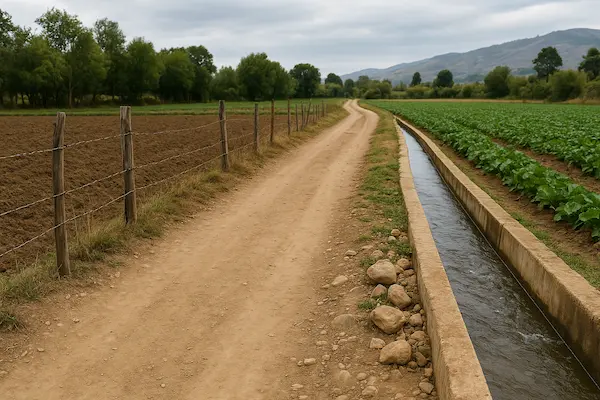WHAT ARE MANDATORY EASEMENTS?

HOW TO OBTAIN A RIGHT-OF-WAY EASEMENT IN BOLIVIA
RIGHT OF WAY DUE TO NECESSITY
A landowner whose property is landlocked—surrounded by other parcels without access to a public road—has the legal right to request a right-of-way through a neighboring property. This remedy applies only when there is no other viable exit without incurring disproportionate inconvenience or cost.
The right-of-way must follow the shortest and least damaging path possible, minimizing the burden on the servient estate. In certain cases, an underground path may be more suitable for both parties.
A common example is a farmer whose land is surrounded by private properties and lacks access to a roadway; the farmer may file a legal request for a right-of-way to transport agricultural products.
COMPENSATION FOR EASEMENTS
A judge will determine the route, scope, and fair compensation for the easement. If the right-of-way affects arable land, the compensation must reflect the value of the affected area. However, if the parties reach a voluntary agreement, the terms of that agreement will prevail.
If the landlocked condition results from a property sale or subdivision, the new owner may request access without paying compensation—unless otherwise agreed. Once the right-of-way becomes unnecessary (for example, due to the construction of a public road), the easement terminates, and any compensation previously paid must be returned.
AQUEDUCT EASEMENTS
RIGHT TO TRANSPORT WATER FOR AGRICULTURAL OR INDUSTRIAL USE
A property owner who requires water for agricultural or industrial purposes may request to transport water through neighboring land. The easement may be temporary or permanent but cannot be imposed on homes, gardens, or patios.
To qualify for this right, the applicant must prove legal access to water, that the quantity is sufficient, and that the proposed route is optimal and causes minimal harm to neighboring properties.
CONDITIONS AND COMPENSATION FOR WATER EASEMENTS
Compensation to the affected property owner includes:
- The value of the land occupied by the aqueduct and a one-meter buffer zone on either side.
- Any damage caused during construction.
For temporary easements (e.g., lasting up to five years), compensation is reduced proportionally, and the applicant must restore the land to its original state upon expiration.
If the servient estate already has a functional aqueduct, its owner may offer its use for the new water flow, provided it causes no harm. Compensation in this case is calculated based on shared use and maintenance costs.
SHARED USE OF AQUEDUCTS
Multiple property owners may jointly agree to build and use a shared aqueduct, dividing the costs of compensation, maintenance, and usage. These agreements must clearly define usage schedules (known locally as “mitas”) to ensure fairness for all parties.
INDUSTRIAL AND PUBLIC EASEMENTS
In certain situations, landowners may be required to allow the installation of telephone lines, electrical cables, cable cars, or other industrial or agricultural infrastructure on their property. These projects must comply with relevant technical standards and legal regulations, ensuring minimal disruption to the affected land.
In summary, mandatory easements reconcile private interests with the social function of property. Right-of-way and aqueduct easements are legal tools that promote agricultural production, basic service access, and economic development while safeguarding the rights of affected landowners through fair and proportional compensation. Judicial or administrative oversight ensures these mechanisms are applied legally and equitably.
If you are dealing with a matter related to easements, our law firm offers expert legal advice on property rights, including the establishment, regulation, or termination of easements. Contact us today for specialized legal assistance.
Frequently Asked Questions (FAQs)
When can I request a right-of-way easement?
You may request it when your property has no reasonable access to a public road without causing significant inconvenience or cost.
Is compensation to the neighbor always required?
Yes, unless the landlocked condition was caused by a sale or subdivision, in which case compensation may not apply.
Can I request an easement to transport water to my land?
Yes, provided you can justify the need, prove legal access to water, and demonstrate that the proposed route is appropriate.
What if the affected land already has an aqueduct?
The owner may offer its use, and compensation will be based on the value of shared usage and maintenance costs.
Is it possible to request a temporary easement?
Yes, easements can be established for a fixed period, after which the land must be restored to its original condition.
The content of this article does not reflect the technical opinion of Rigoberto Paredes & Associates and should not be considered a substitute for legal advice. The information presented herein corresponds to the date of publication and may be outdated at the time of reading. Rigoberto Paredes & Associates assumes no responsibility for keeping the information in this article up to date, as legal regulations may change over time.


